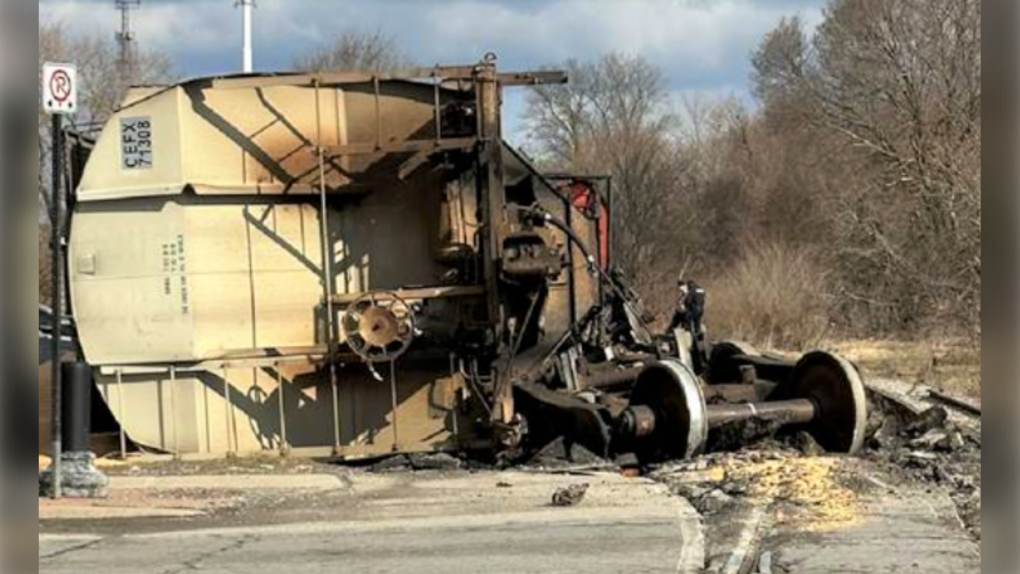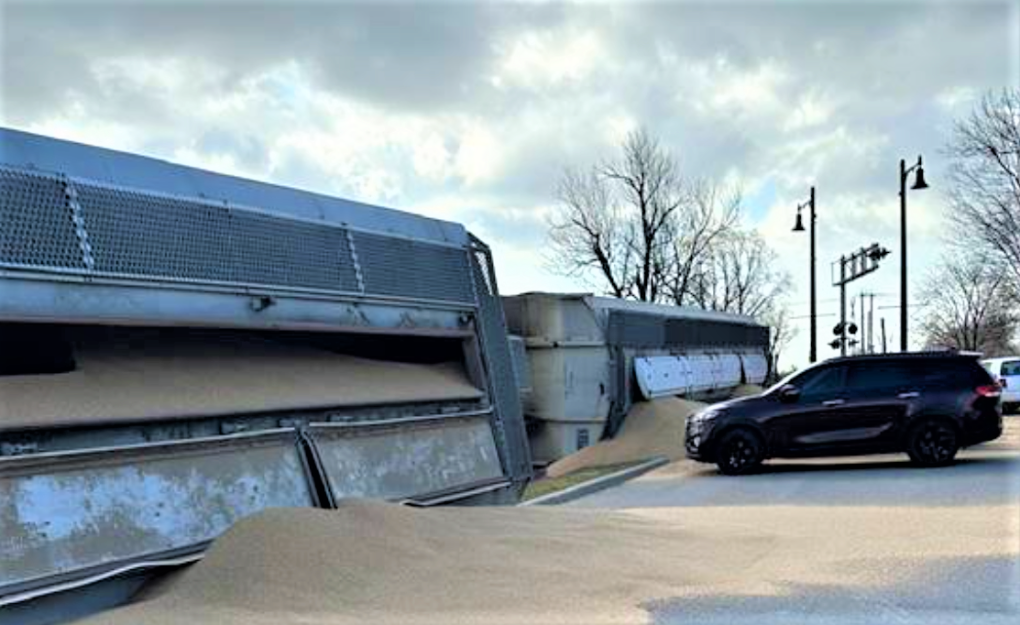Officials investigating what caused 14-car train to derail in Ontario this weekend
 A derailed train can be seen above in Port Colborne, Ont. on March 18 (NRPS)
A derailed train can be seen above in Port Colborne, Ont. on March 18 (NRPS)
The cause of a large train derailment in Ontario’s Niagara region over the weekend is still unknown, police said Monday.
The crash took place on Saturday, just before 10:30 a.m., in Port Colborne, Ont., near Main and King streets.
No one was injured, according to a release issued by Niagara police, and there is no indication the train tracks had been tampered with.
”Officers [...] responded alongside Port Colborne Fire & Emergency Services and [...] paramedics for what was reported as a derailed train," the release reads.
“Upon arrival, it was determined a train with 14 attached train cars was travelling from the Sugarloaf Mill to the Robinhood Mill when the last three hopper style train cars became dislodged from the track and subsequently tipped over,” it continues.
The train was carrying grain, officials said, and resulted in a “substantial” amount of Ontario wheat being spilled into a nearby parking lot.
 Piles of Ontario wheat spilled from a derailed train in Port Colbourne, Ont. on March 18 (NRPS)
Piles of Ontario wheat spilled from a derailed train in Port Colbourne, Ont. on March 18 (NRPS)
A video of the crash aftermath posted on social media shows several train cars lying on their side beside a parking lot filled with mountains of wheat and what appears to be damaged tracks.
The Ministry of Environment has attended the scene and concluded that the grain did not pose any environmental concerns, police said.
Vacuum trucks were called in, and the wheat has since been cleaned up and removed, they added.
The cause of the derailment remains under investigation by Transport Canada and Niagara police.
CTVNews.ca Top Stories

W5 Investigates Provinces look to Saskatchewan on how to collect millions more for victims of crime
A W5 investigation showed how convicted criminals ordered to pay restitution struggled to do so, and how just $7 million of more than $250 million had been confirmed to be claimed. While many provinces struggle to keep track, Saskatchewan is leading the way in making sure victims get their money.
PM Justin Trudeau planning to oversee sizable cabinet shuffle on Friday: sources
Prime Minister Justin Trudeau is planning a sizable cabinet shuffle on Friday, sources confirm to CTV News. The long-awaited reconfiguration of Trudeau's front bench comes amid turmoil for the Liberal government after the shocking resignation of Chrystia Freeland.
Child struck by vehicle south of London has died
According to an online fundraiser organized by a family friend, the boy who was hit by a driver south of London earlier this week has died.
Toronto officer dies after suspected medical episode while executing search warrant: TPS
A police officer who died after having a suspected medical episode on duty was executing a search warrant in connection with an ongoing robbery investigation in North York, Toronto police confirmed Thursday.
N.B. Liberal government revises Policy 713, parental consent no longer required for students' preferred names
The New Brunswick Liberals are reversing course on the previous government’s decision to change Policy 713.
Manitoba man wins $40M Lotto Max jackpot, among top 5 jackpots in province's history
A Manitoba man has won one of the top five largest lottery jackpots in Manitoba history.
Conan O'Brien pays tribute to his parents who died within days of each other
Conan O’Brien is remembering his recently deceased parents. In an interview with the Boston Globe, the former late night television host talked about his mother, Ruth Reardon O’Brien, who died last Thursday, and Dr. Thomas F. O’Brien, who preceded his wife in death three days earlier.
How stimulating the body's largest nerve may relieve severe depression
A yearlong trial of 493 adults, with an average age of 53, found vagus nerve stimulation therapy led to improvement in participants' depressive symptoms, ability to complete daily tasks and quality of life.
Amazon workers strike at multiple facilities as Teamsters seek labour contract
Workers at seven Amazon facilities went on strike Thursday, an effort by the Teamsters union to pressure the e-commerce company for a labour agreement during a key shopping period.

































